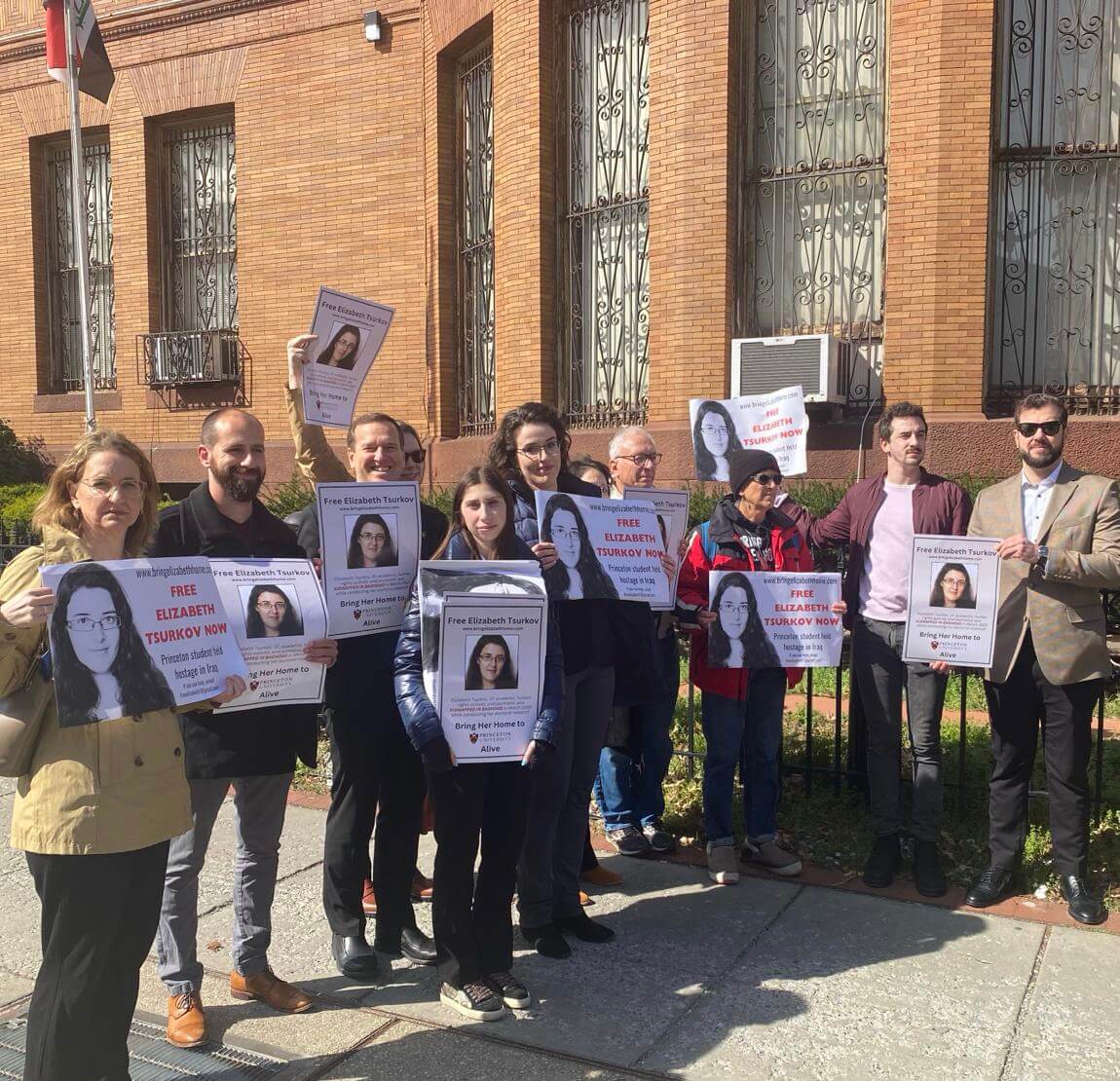As Evan Gershkovich returns home, another Jewish prisoner’s captivity reaches 500 days
The family of Elizabeth Tsurkov, a Princeton graduate student kidnapped in Iraq in 2023, has been told that she is still alive

Supporters of Elizabeth Tsurkov, an academic kidnapped in Iraq a year ago, held a rally at the Iraqi Embassy in Washington, Mar. 21, 2024. Her sister Emma is standing center, with glasses. Courtesy of Dafna Lender
The flurry of messages that awaited Emma Tsurkov when she awoke Thursday sent her into a panic.
The texts came in response to the release of Evan Gershkovich, the Wall Street Journal reporter who was freed overnight along with other American political prisoners. They were from people who knew that while so many would be celebrating their release, Tsurkov’s feelings would be bittersweet: Thursday was the 500th day since her sister, Elizabeth Tsurkov, was abducted by an Iraqi paramilitary group.
“That they’re on their way home and will get to hug their loved ones soon, is really a great comfort to my injured soul,” Emma said in an interview from her home near San Francisco. “That’s the sweet part. The bitter part is I really, really, really desperately want to see my sister, and hug her, and read that she’s the prisoner being released.”
Signs of life
Elizabeth, 37, a Russian-Israeli citizen who had lived in the U.S. since 2017, was doing research in Baghdad for her doctorate in political science at Princeton when she was kidnapped by Kataib Hezbollah, also known as KH. The radical, Iran-backed Shi’a militia, designated a terrorist group by the U.S., falls under the purview of the Iraqi prime minister as part of its armed forces. Like Gershkovich, Tsurkov was accused of spying by her captors.
Elizabeth Tsurkov’s first and to date only sign of life since then came last November, when KH released a video in which she claimed to be a Mossad and CIA spy, a confession her sister says was coerced and “1,000%, absolutely false.” But Emma says U.S. authorities have told her in the last month that her sister was still alive.
Yet much is unclear about her sister’s case. KH has never named a ransom or demands for her release, to Emma’s knowledge. It isn’t clear why she was taken hostage to begin with. Emma believes her sister’s Jewish identity was a factor.
Meanwhile, Emma has felt her efforts to pressure the White House outweighed by concern that leaning too hard on Iraq might threaten diplomatic ties between the two nations.
Because KH is part of Iraq’s Popular Mobilization Forces, an association of paramilitary organizations formed roughly a decade ago to fight ISIS, it receives funding from the Iraqi government — including, Emma says, money and weapons that trickle down from American foreign aid packages.
“This isn’t some militia hiding in the mountains, in some caves that no one can find or reach,” Emma said. “They’re roaming the halls of power in Baghdad without a worry in the world. Their salaries are getting paid while they hold a Princeton graduate student hostage.”
Lobbying for Elizabeth
When Iraqi Prime Minister Mohammed Shia’ Al Sudani visited the White House in April, Emma and her two other siblings flew to Washington, D.C., where they unsuccessfully pushed members of Congress to condition arms sales to Iraq on Elizabeth’s release.
And while President Biden brought up her sister when he met Al Sudani in the Oval Office, Emma said, and she was told the prime minister promised to find out who was holding Elizabeth, “we have yet to see any additional movement.”
At the conclusion of the visit, the U.S. State Department announced $140 million in additional aircraft carrier support and training to Iraq. It published another statement July 24 on “joint security cooperation dialogue.”
The Gershkovich news lifted Emma’s hopes. But she had no illusions about what it would take to bring her sister home.
“Prisoners don’t get released through miracles,” she said. “They get released through hard work, advocacy and compromises. My sister is an incredibly sweet and kind soul and she does not deserve this kind of anguish. Without her it feels like everything in life is tasteless.”

















